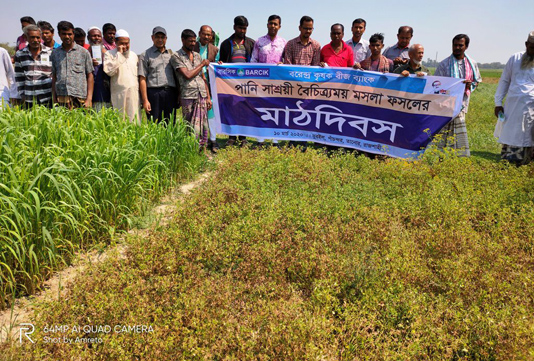RAJSHAHI, March 11, 2020 (BSS)- Instead of depending on only Irri-Boro
farming, emphasis should be given to the promotion of less-irrigation
consuming spicy crops in Barind area to lessen the gradually mounting
pressure on underground water.
Large-scale promotion of less-water consuming crops could be an effective
means of mitigating water-stress condition in the drought-prone Barind area.
Agricultural experts and development activists made this observation while
addressing farmers’ field day meeting at Dubail village under Tanore upazila
of the district today.
Bangladesh Resource Centre for Indigenous Knowledge (BARCIK) and Barendra
Seed Bank jointly organised the meeting where various aspects of promoting
water-saving spicy crops in the drought-prone Barind area discussed
elaborately.
On the occasion, farming process of 10 water-saving spicy crops was
disseminated among the attending farmers.
Upazila Agriculture Extension Officer Muhammad Saifullah, Upazila vice-
chairman Abu Bakkar, BARCIK Director Towhidul Alam, national agriculture
award winning farmer Nur Muhammad and BARCIK Regional Coordinator Shahidul
Islam addressed the meeting as resource persons with national environment
award winning farmer Yousuf Ali Mollah in the chair.
Nur Muhammad said that adverse impacts of climate change have triggered
recurrence of natural calamities, posing a serious threat to the farming of
cereal crops, including Irri-boro, and the living conditions of farmers in
the drought-prone Barind area.
He referred to various research findings and mentioned that there are
enormous scopes of increasing the acreage of various low-water consuming
crops like cumin, sesame, coriander and black cumin in the high Barind tract.
Steps should be taken to expand the farming of spicy crops to the high
barind area to mitigate the water-stressed condition, he added.
Yousuf Ali Mollah said all the authorities concerned and farmers should
come forward and work together to this end. Farmers in the hard Barind area
need time-fitting training and motivation on how to cultivate more less-
irrigated crops to lessen the existing pressure on groundwater, he added.



